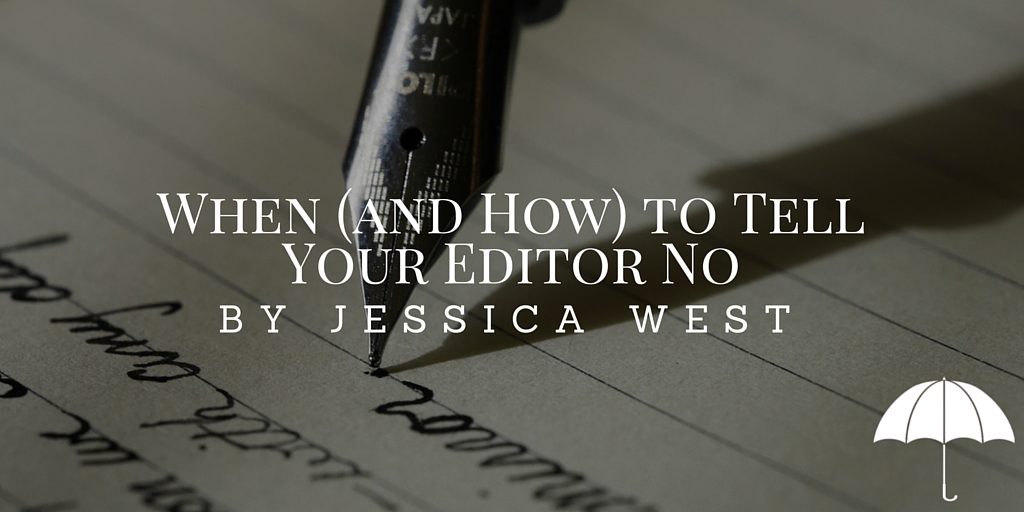What do you do if you have no intention of taking your editor’s advice?
I don’t have experience with traditional publishing, so this article will apply to independent authors who have the final say in their manuscripts. For authors working with publishers (with or without representation), this kind of thing is a whole other ball game. But I haven’t played it, so I won’t go there.
For my fellow indies …
There’s nothing quite like the feeling of What-The-Holy-YouKnowWhat-is-This dismay when you get your manuscript back from your editor. If you’re like most authors, you need a few minutes (hours, days, weeks) to let the dust settle and the thoughts of vengeance die (or at least fade to a manageable level). That’s totally normal. But what happens when you’ve approached the suggestions rationally and still come up scratching your head?
You Decide
Put simply, you don’t owe your editor anything. Not. One. Darn. Thing. Except, you know, the money you agreed to pay them. But that’s it. You don’t have to accept their suggestions. You don’t have to apply their advice. And most importantly (and I cannot stress this enough), you do not owe them an explanation.
You do owe it to yourself to give your editor’s advice careful consideration. After all, you paid for this service. Get your money’s worth. If you’re uncertain whether or not you should accept a suggestion, ask them about it. As an author, I’ve worked with a few editors. They’ve all given the impression they want to communicate. As an editor, I’ve worked with … I don’t know how many authors. Quite a few. I try to make sure they know I want to communicate. Trust me, you’re not bothering your editor if you ask them to chat about this suggestion they made on your manuscript.
Don’t Argue
While it’s a great idea to ask your editor about something you’re unsure of, it’s not a good idea to reply to every comment telling them why you aren’t taking their advice. I say that, but maybe they’ll learn something. That’s always good. But, more often than not, you’re not opening a dialogue with that. And if you do, it’s not necessarily a positive or constructive one. Most importantly, you have nothing to gain by doing that. It’s a waste of your time and your editor’s time.
This only applies when you have zero intention of budging on an edit. If you want to talk it out and may consider taking their advice, then proceed. But don’t argue for the sake of arguing. That rarely ends well. Best case scenario, you’ll make it through the editing process relatively unscathed. Worst case scenario, you end up on someone’s black list.
Before you comment on one of their suggestions, ask yourself a few questions.
1- Do I need them to clarify?
If you answered yes- Ask your editor to clarify. Be specific. Don’t just say, “What?” Talk to them. Send them a Facebook message or email if you have to. But you want a detailed explanation, so send a detailed question. Open the dialogue.
No- See #2.
2- Did we discuss and agree on a specific style guide, but a suggestion conflicts with that?
If you answered yes- Send your editor a polite message letting them know that you’ve come across a suggestion that may not be in keeping with the style guide you’ve chosen to adhere to. We all make mistakes. An editor working on several books with various authors who have different preferences may make a mistake. This is one reason why a separate proofreader is a good idea.
No- See #3.
3- Is it possible I’m going to take their advice after I speak with them?
If you answered yes- Send them your question. Copy and paste the text into your message for quick reference if your questions pertain to a specific, small section. If it’s a higher level question (Does this chapter work here, or should I move it to after the Snow Queen invades Hades and freezes it over?), then don’t email actual content. Go into as much detail as you need to, but be concise.
No- What do you stand to gain from sending this comment/reply/message? If your only reason for communicating is to defend or explain your choice to your editor, you’re wasting your time. You don’t get anything out of that.
Now, in some instances, there are good reasons for a snarky reply to your editor. If you have that kind of relationship where you can exchange banter, then it’s good. I have an author like that. I love working with her because she’ll toss out a “Nope, that’s not happening, Jess,” every once in a while and it makes editing fun. But if that snark is directed at someone you barely know, reconsider.
So how do you tell your editor no?
If you’re not going to make this change no matter what your editor says, you simply reject the suggestion (in track changes) or delete the comment. That’s it. You don’t owe your editor an explanation, and you’re only wasting your time (and theirs) by calling attention to something you have no intention of revising. Let it go. Ask them about issues you do want further feedback on, things you may consider editing. That is where your time is best spent, and time is in limited supply. Make the most of the money you spend on editing by not bothering to tell your editor no or explaining why you’re saying no.
Ask a question or make a decision. It’s your call.


Leave a Reply